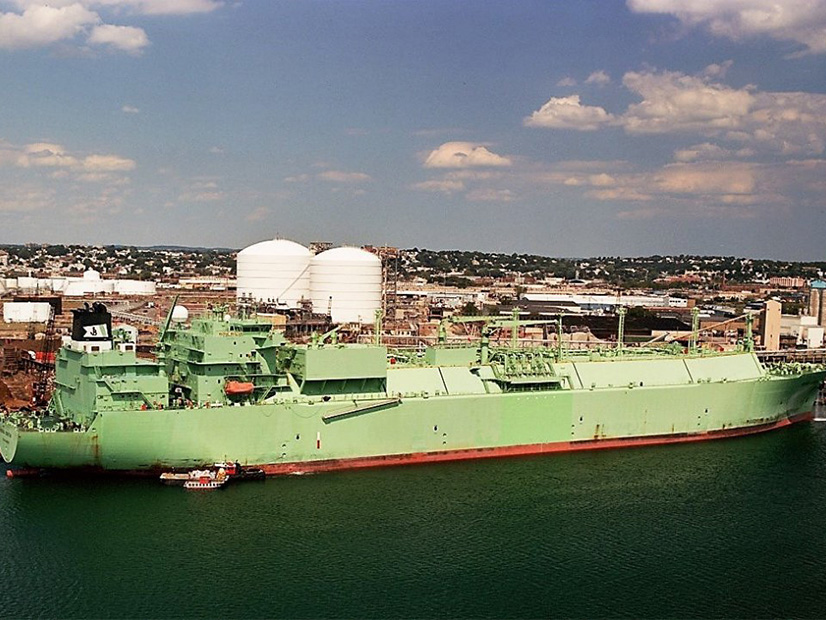BOSTON — Hoping for a mild winter is not a sustainable plan for reliability, FERC Chairman Willie Phillips said at the Dec. 7 NEPOOL Participants Committee meeting. He said he’s concerned premature retirements of legacy generators and infrastructure will threaten the reliability of the New England grid.
Phillips expanded upon his concerns, initially outlined in a letter co-signed with NERC CEO Jim Robb regarding the potential loss of the Everett LNG import facility in Massachusetts. (See FERC, NERC Leaders Voice Concern About Loss of Everett Marine Terminal.)
While ISO-NE’s winter reliability studies indicate Everett doesn’t significantly improve the reliability of the grid during extreme weather conditions, Phillips said the RTO should “continue to work and think about the assumptions and the methodology that are used in that study to make sure that we get this right.” (See ISO-NE Study Highlights the Importance of OSW, Nuclear, Stored Fuel.)
Asked whether electric ratepayers should bear the costs of keeping Everett open, Phillips responded “I don’t have an opinion — and I’m not here to give one — on who should pay,” adding that it’s not FERC’s jurisdiction to make the decision.
The chairman also connected the need to maintain grid reliability to the region’s decarbonization goals. While applauding the states’ clean energy ambitions, Phillips said the region must keep reliability “top of mind” as it pursues its clean energy goals.
“If we get this wrong, it is the transition that will be blamed,” Phillips said.
Phillips also emphasized the need to consider environmental justice and existing energy infrastructure burdens when planning and siting new infrastructure.
“I grew up in an environmental justice community,” Phillips said. “I know what it smells like.”
He said he hopes to issue an “outward-facing guidance document” detailing expectations regarding engagement with environmental justice communities.
Prior to Phillips’ speech, a group of climate activists associated with the organization No Coal No Gas pressed NEPOOL officers to let them sit in on the meeting, which the NEPOOL officers allowed.
While New England ratepayers can join the organization for a $500 membership fee, several members of ISO-NE’s Consumer Liaison Group Coordinating Committee (CLGCC) who lack institutional support are not NEPOOL members.
In December 2022, No Coal No Gas successfully elected a slate of candidates to the CLGCC which included several members of the climate group. (See Climate Activists Take Over Small Piece of ISO-NE.) The group now is pushing for elected CLGCC members to be given governance-only seats at NEPOOL.
Operations Report
The total energy market value in November was up by about 45% compared to October but was more than 40% less than the total value from November of 2022, ISO-NE COO Vamsi Chadalavada told the PC. The monthly increase relative to October was because of higher natural gas prices, Chadalavada said.
The estimated carbon emissions from November were down relative to both October of this year and November of 2022, Chadalavada added.
Regarding this winter, Chadalavada said ISO-NE’s capacity analyses based on the forecasted load indicate “a surplus even after accounting for generation at risk due to gas supply.” (See ISO-NE Says Region Has Enough Resources for Upcoming Winter.)
Chadalavada added that the region’s weather can change quickly and noted that “extended periods of cold weather may rapidly deplete stored fuel inventories and capacity outlook will be adjusted accordingly.”
IMM Report
David Naughton, executive director of ISO-NE’s Internal Market Monitor (IMM), presented to the PC on the IMM’s 2022 Annual Markets Report.
The report notes that weather-normalized load has increased slightly over the past two years following years of decline due to energy efficiency efforts.
“The trend of decreasing load may have reached an inflection point,” the report states, adding that “while it is difficult to attribute this directly to any particular driver, this change is consistent with the ISO forecast that average load will increase each year with the continued adoption of electricity-fueled transportation and electric heating.”
Naughton also noted total energy costs in 2022 nearly doubled compared to 2021 and were the highest since 2008.
In other NEPOOL business, the PC approved the 2024 NEPOOL expense budget and elected a slate of officers to run the PC in 2024, which will by chaired by Sarah Bresolin of ENGIE North America. The PC also voted to support changes to its Financial Assurance Policy regarding the calculation of Forward Capacity Market delivery financial assurance.




